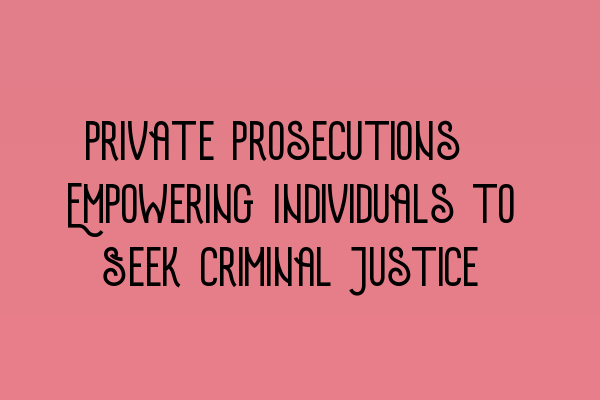Private Prosecutions: Empowering Individuals to Seek Criminal Justice
Private prosecutions provide individuals with the opportunity to seek criminal justice when traditional law enforcement agencies, such as the police, are unable or unwilling to take action. This legal avenue empowers ordinary citizens and companies to bring criminal charges against individuals or organizations that have committed offenses against them.
Private prosecutions have gained popularity in recent years as people recognize the importance of holding wrongdoers accountable for their actions. By taking legal action, individuals can restore their sense of justice, protect their interests, and send a strong message that criminal behavior will not go unpunished.
Advantages of Private Prosecutions
One of the primary advantages of private prosecutions is the ability to exercise control over the legal process. Unlike public prosecutions, where the decision to prosecute lies with law enforcement agencies, private prosecutions allow individuals to decide when and whom to prosecute. This control ensures that their case receives the attention it deserves and increases the chances of a successful outcome.
Furthermore, private prosecutions can often be more efficient than their public counterparts. Traditional law enforcement agencies are often burdened with heavy caseloads, resulting in delays and backlogs. Private prosecutions, on the other hand, can proceed at a faster pace, providing a more timely resolution for victims of crime.
Additionally, private prosecutions can be particularly beneficial in cases involving complex or niche areas of law. Public prosecutors may lack the specialist knowledge required to effectively handle such cases. By pursuing a private prosecution, individuals can engage legal experts who possess the expertise necessary for a successful outcome.
Procedure for Private Prosecutions
Private prosecutions follow a similar procedure to public prosecutions, ensuring that the accused receives a fair trial. The process typically involves the following steps:
- Gathering evidence: Collecting all relevant evidence to support the allegations.
- Issuing proceedings: Initiating legal proceedings by filing the necessary documents with the appropriate court.
- Case preparation: Preparing the case by examining witnesses, conducting legal research, and developing legal arguments.
- Disclosure: Providing the accused with all relevant evidence, as required by law.
- Trial: Presenting the case before a judge or jury to determine the guilt or innocence of the accused.
- Sentencing: If the accused is found guilty, the court will determine an appropriate sentence.
It is essential for individuals considering a private prosecution to seek legal advice to navigate the complexities of the legal process successfully. Qualified solicitors with expertise in criminal law can provide valuable guidance and ensure that their clients’ rights are protected throughout the proceedings.
Conclusion
Private prosecutions offer a powerful tool for individuals and organizations to seek criminal justice and hold wrongdoers accountable. By providing control, efficiency, and expertise, this legal avenue empowers individuals to take action when confronted with criminal offenses.
If you are considering a private prosecution or would like more information on criminal law and practice, please visit our website for more details.
